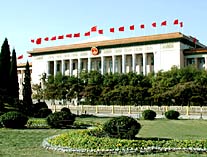 China's first draft civil code was submitted to the top legislative body for preliminary reading yesterday, raising hopes of better protection of the rights of individuals and corporations.
China's first draft civil code was submitted to the top legislative body for preliminary reading yesterday, raising hopes of better protection of the rights of individuals and corporations.
The draft code designates a whole section to the protection of personal rights concerning name, image, reputation, honor and credit.
"It is a major move in enhancing protection of human rights," said Wang Liming, a leading civil law professor with the Law School of Renmin University of China.
For the first time, the draft code offers clear provisions on how to protect an individual's privacy.
The draft has also expanded the scope of compensation for emotional suffering resulting from the infringement of these rights.
The draft code was welcomed by the public because it filled a major gap in civil legislation.
It has also introduced property law -- a major part of civil legislation.
Composed of nine sections, the 216-page draft code is the most voluminous legislation in the country with around 1,200 clauses.
The 1986 General Principles of Civil Law -- currently serving as the major civil legislation in China -- has only 156 clauses.
Since it set a target of building a socialist market economy, the nation has desperately required a civil code to play a fundamental role in safeguarding the rights of individuals and corporations, said Wang Shengming, director of the Civil Legislation Office with the Legal Affairs Commission of the Standing Committee of the National People's Congress (NPC).
The draft civil code was submitted to the latest session of the NPC Standing Committee, which kicked off yesterday.
The six-day session will also review a draft amendment to the nation's Criminal Code.
The draft amendments also target the illegal employment of child laborers and the transfer of illegally felled trees, said Hu Kangsheng, vice-director of the Legal Affairs Commission of the NPC Standing Committee when he submitted the draft amendments to the session.
Anyone who hires children aged 16 years or younger to do manual labor or work in a dangerous environment using explosive, inflammable, radioactive or poisonous substances faces up to three years in prison if caught.
But the provisions do not exclude poor youngsters, especially those in rural areas, from taking part-time jobs to help support their families, said Huang Taiyun, vice-director of the Criminal Legislation Office with the Legal Affairs Commission of the NPC Standing Committee.
The draft amendments also aim to tighten punishment of illegal trafficking of foreign waste. Those who smuggle solid, liquid or gaseous waste into China face a sentence of up to five years in prison.
Gross violators could face sentences of more than five years in prison and a financial punishment, according to the amendments.
Importers of waste under the pretense of raw materials would face similar punishments.
(China Daily December 24, 2002)
|

